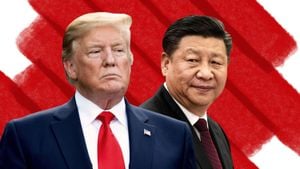Switzerland is open to contributing troops to support potential peacekeeping missions in Ukraine, according to the country's armed forces chief, Thomas Suessli. He stated during an interview published on February 23, 2023, "We could probably field around 200 soldiers in nine to 12 months" if such a request was formally made and the Swiss government agreed. While discussions of sending peacekeepers are still mostly hypothetical, the conversation around this possibility gains traction amid international diplomatic efforts to address the enduring conflict between Ukraine and Russia.
Suessli emphasized the importance of differentiaring between peacekeeping and peace-enforcement operations. He made it clear, saying, "Peace enforcement means peace must be imposed by force of arms. Switzerland does not participate.” This distinction highlights Switzerland’s commitment to its long-standing policy of neutrality. He added, “Peacekeeping presupposes Russia and Ukraine agree to cease hostilities and accept the UN sending a peacekeeping force to guarantee peace.” Yet, he pointed out, the current situation lacks the fundamental requirement for such operations, as there have been no formal requests from the United Nations, and no peace has been established to date. Suessli underlined this decision lies with the government and parliament, remarking, "There’s no peace yet and there has been no request from the United Nations."
Historically, Switzerland has participated actively in several peacekeeping missions across the globe, with the most notable being the deployment of troops to Kosovo as part of NATO's Kosovo Force (KFOR). This experience positions Switzerland to engage effectively if the need for peacekeepers arises. The Swiss armed forces chief explained, “If we receive the order to take part in the mission, we would draw up a training concept to train our soldiers and prepare them for deployment.”
Suessli also acknowledged existing geopolitical conversations among European powers about the feasibility of deploying peacekeepers to Ukraine as the conflict continues. Since Russia initiated its full-scale invasion of Ukraine in 2022, the situation has evolved without signs of resolution, making the prospect of diplomatic engagements vitally important. With Switzerland’s neutral stance, its citizens have expressed opinions on military involvement, weighing national values against international responsibilities.
This conversation also links to Switzerland's significant humanitarian efforts. To date, the country has provided over $3 billion in economic and humanitarian support to Ukraine, reflecting its commitment to aid without compromising its neutrality through military assistance. While discussing potential military contributions, it’s also worth noting Switzerland’s integral role hosting significant international conferences, such as the 2022 Ukraine Recovery Conference held in Lugano, which laid out principles for rebuilding the war-torn nation.
Diplomatic discussions are intensifying among various nations, pondering over plans for peacekeeping efforts as the war stretches on. Suessli's remarks suggest Switzerland is positioning itself cautiously, maintaining its identity as a neutral party, yet admitting it can assist if called upon under the right conditions. He mentioned, “We are well positioned in logistics and medical services,” which could align with UN requirements if peacekeeping operations were to be approved.
Despite the uncertainty surrounding military aid, the Swiss government has shown commitment to its core values of neutrality and humanitarian engagement. The question remains, to what extent will Switzerland engage militarily if the geopolitical climate continues to shift? Observers are watching closely, as the dynamics between Russia and Ukraine remain delicate, and any unilateral actions could carry ramifications for Switzerland’s historical neutrality.
While the outcomes of potential peacekeeping missions may still be uncertain, the dialogue around Switzerland's potential role lends insight not only to its military readiness but also to broader discussions about European stability. The willingness to discuss troop deployment parallels the region's desire for sustainable peace arrangements and could signal Switzerland's readiness to participate meaningfully at the request of international communities.
For now, the future of Switzerland's involvement in peacekeeping remains speculative, contingent upon developments within the conflict and the responses from affected parties. With discussions underway among various European nations about sending peacekeepers to Ukraine, Suessli's statements add another dimension to the conversation, highlighting the need for careful consideration of neutrality and the purpose behind such military actions should they arise.
Switzerland’s legacy of neutrality could encounter pressing challenges amid these discussions, defining the nation's path forward at this juncture of international relations.



